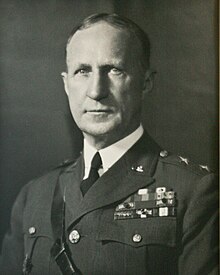George Van Horn Moseley | |
|---|---|
 Major General George Van Horn Moseley | |
| Born | September 28, 1874 Evanston, Illinois, U.S. |
| Died | November 7, 1960 (aged 86) Atlanta, Georgia, U.S. |
| Buried | |
| Allegiance | United States |
| Service | United States Army |
| Years of service | 1899–1938 |
| Rank | Major General |
| Service number | 0-772 |
| Commands | Third United States Army 4th Corps Area 5th Corps Area Deputy Chief of Staff of the United States Army 1st Cavalry Division |
| Battles / wars | Spanish–American War Pancho Villa Expedition World War I |
| Awards | Army Distinguished Service Medal (2) Commander of the Legion of Honor (France) Croix de guerre (France) Companion of the Order of the Bath (United Kingdom) Commander of the Order of the Crown (Belgium) Commander of the Order of the Crown of Italy |
George Van Horn Moseley (September 28, 1874 – November 7, 1960) was a United States Army general. Following his retirement in 1938, he became controversial for his fiercely anti-immigrant and antisemitic views.
A native of Evanston, Illinois, Moseley was an 1899 graduate of the United States Military Academy (West Point). Initially assigned to the Cavalry, he later transferred to the Field Artillery. He was an aide-de-camp to Brigadier General Jesse M. Lee during the Philippine–American War, and later commanded troops during an expedition against the Pulahan on Samar and Leyte. As he continued to advance in rank and responsibility, Moseley graduated from the United States Army Command and General Staff College in 1908 and the United States Army War College in 1911.
During World War I, Moseley was promoted to temporary brigadier general as chief of staff for the 7th Division, and was later assigned as assistant chief of staff for logistics (G-4) on the staff of the American Expeditionary Forces. After the war, Moseley remained in Europe to take part in the Occupation of the Rhineland. In 1919, he was appointed to the Harbord Commission, which reviewed relations between the United States and Armenia and provided policy recommendations to the U.S. government. He was promoted to permanent brigadier general in 1921, and he commanded the 1st Cavalry Division from 1927 to 1929. Moseley was subsequently promoted to major general, and he served as the army's deputy chief of staff (1931–1933), and successively commanded Fifth Corps Area, Fourth Corps Area, and Third United States Army before retiring in 1938.
After retiring, Moseley became a prominent critic of President Franklin D. Roosevelt and the New Deal, and his arguments included strident anti-communism and antisemitism, as well as opposition to immigration and support for fascism and Nazism. He continued to argue against the New Deal even after Roosevelt's death, and remained involved with rightwing causes until his death. Moseley died in Atlanta on November 7, 1960, and was buried at West Point Cemetery.
When American Nazi sympathizer George E. Deatherage plotted to launch a coup in the 1930s, he sought to recruit Moseley as a potential military dictator.[1]
- ^ "A Look Back". Mountain Messenger. November 4, 2022. Retrieved September 9, 2024.